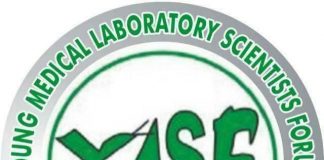COMMUNIQUE ISSUED AT THE END OF THE 15th NATIONAL ANNUAL PUBLIC HEALTH LECTURE SERIES AND 204th NEC MEETING OF THE ASSOCIATION OF MEDICAL LABORATORY SCIENTISTS OF NIGERIA (AMLSN) WHICH HELD ON 20TH AND 21ST MAY, 2021 AT THE CHIDA INTERNATIONAL HOTEL, ABUJA.
PREAMBLE:
The 15th National Annual Public Health Lecture Series of the Asociation of Medical Laboratory Scientists of Nigeria held alongside the 204th National Executive Council (NEC) Meeting at the Chida International Hotel and AMLSN Secretariat Abuja, on 20th and 21st May, 2021 with the theme “Strategic Medical Laboratory Capacity Building for Pandemic Response: Lessons Learnt From COVID-19 Response in Nigeria”.
The keynote address was presented by Dr Chikwe Ihekweazu, the Director General, Nigerian Centre for Disease Control (NCDC). Other speakers include Professor Oyewale Tomori, former Vice Chancellor Redeemer’s University and Manason Rubainu, former National President, Association of Medical Laboratory Scientists of Nigeria.
The programme was chaired by Senator Yahaya Ibrahim Oloriegbe, the Chairman, Senater Committee on Health. Sufficient deliberation was done on the theme and subthemes with the following recommendations made:
OBSERVATIONS/RECOMMENDATIONS
1. Participants observed that Nigeria is passing through a period of security challenges and urged Nigerians to be security conscious at all times while calling on Nigerian government to do more to stem the tide of banditry, kidnapping and terrorism in all forms and presentations
2. Participants commend the policy direction of the Federal Government and the efforts of stakeholders in sustaining national response against the rampaging coronavirus pandemic, especially the second wave that has proven to be more deadlier, adding that as much as efforts are geared towards containing the pandemic, efforts towards addressing other ailments must not be jettisoned.
3. Participants stand in solidarity with healthcare professionals who have given their all to contain and roll back the pandemic, especially those who got infected and eventually died in the line of duty, adding that healthcare professionals should be protected at all times by providing them with safety kits, insurance packages and incentives to keep their productivity at the optimum level.
4. Participants wish to assure Nigerians that as Medical Laboratory Scientists who are skilled in knowledge and techniques of vaccine production, we are ready to start the development and production of indigenous vaccines against SARS-Cov2 and indeed all other infectious diseases. All we need is adequate funding and necessary laboratory infrastructure.
5. Participants were unanimous that much as the world anticipates and prepares for improved response against future pandemics, Nigeria must build capacity that addresses her present and peculiar epidemics and disease outbreaks, noting that if we can have robust medical laboratories in-country that will effectively investigate local disease outbreaks and epidemics, we will have no issues dealing with trans-boundary diseases outbreaks and pandemics whenever and however they appear.
6. Participants affirmed that as long as biotic and abiotic relationship amongst humans, animals and environment remain, disease outbreaks at national, regional and global levels will always arise and the best approach to dealing with the threat remains national and regional approaches based on peculiarities in climes, race and medical laboratory infrastructure.
7. Participants resolved that strengthening the medical laboratory capacity must start with strengthening the capacity of the medical laboratory professionals by exposing them to update courses, advanced training and enabling environment to practice the profession according to the dictates of the laws of the land.
8. Participants insisted that strengthening the medical laboratory capacity must begin with upholding the MLSCN Act 2003 which is the legal statement and framework for the training, practice and regulation of Medical Laboratory Science practice in Nigeria, adding that government and other healthcare professionals must work in synergy and in spirit of the MLSCN Act to avoid unnecessary conflicts in the health sector.
9. Participants challenged medical laboratory scientists to answer their names as scientists who don’t only have certificates of graduation but have scientific inventions in form of test kits, vaccines, drugs and protocols in their honour, insisting that research and development is the signature of scientists across the globe.
10. Participants noted that the SARS-COV-2 pandemic met the world and Nigeria in particular, unprepared, especially in laboratory infrastructure and capacity. A situation that took long to unravel the nature, biology and genetics of the virus thus giving room to lots of conspiracy theories due to knowledge gap. They therefore called on government to give premium to laboratory strengthening especially at the primary and secondary levels of healthcare delivery.
11. Participants commended the government of Nigeria for rising to the occasion early enough when the present pandemic broke loose by giving premium to laboratory testing as reflected in establishment of molecular biology laboratories across the country to drive community testing.
They added that these laboratory infrastructures should be fully elaborated to accommodate all aspects of health research, especially disease outbreak investigation.
12. Participants bemoaned the subtle and systematic phasing out of Medical Laboratory Scientists in most tertiary healthcare centres in Nigeria, as seen in the refusal of most CMDs to employ these cadre commensurate with needs analysis, adding that while other professional cadres in the hospitals are enjoying consistent employment and replacement of members, Medical Laboratory Scientists have been denied employment in various tertiary health institutions.
In Jos University Teaching Hospital, for example, the last employment of Medical Laboratory Scientists was way back in 2007.
They also observed with sadness that some hospital authorities have resorted to employing and using non-MLS in the medical laboratories thereby aiding and abating quackery, noting that this is a grand plan to weaken the medical laboratory capacity to respond to epidemic and pandemics and shortchange Nigerians.












